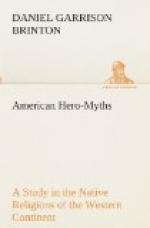The first answer is too intangible, the second too narrow. The rude savage does not philosophize on phenomena; the enlightened student sees in them but interacting forces: yet both may be profoundly religious. Nor can morality be accepted as a criterion of religions. The bloody scenes in the Mexican teocalli were merciful compared with those in the torture rooms of the Inquisition. Yet the religion of Jesus was far above that of Huitzilopochtli.
What I think is the essence, the principle of vitality, in religion, and in all religions, is their supposed control over the destiny of the individual, his weal or woe, his good or bad hap, here or hereafter, as it may be. Rooted infinitely deep in the sense of personality, religion was recognized at the beginning, it will be recognized at the end, as the one indestructible ally in the struggle for individual existence. At heart, all prayers are for preservation, the burden of all litanies is a begging for Life.
This end, these benefits, have been sought by the cults of the world through one of two theories.
The one, that which characterizes the earliest and the crudest religions, teaches that man escapes dangers and secures safety by the performance or avoidance of certain actions. He may credit this or that myth, he may hold to one or many gods; this is unimportant; but he must not fail in the penance or the sacred dance, he must not touch that which is taboo, or he is in peril. The life of these cults is the Deed, their expression is the Rite.
Higher religions discern the inefficacy of the mere Act. They rest their claim on Belief. They establish dogmas, the mental acceptance of which is the one thing needful. In them mythology passes into theology; the act is measured by its motive, the formula by the faith back of it. Their life is the Creed.
The Myth finds vigorous and congenial growth only in the first of these forms. There alone the imagination of the votary is free, there alone it is not fettered by a symbol already defined.
To the student of religions the interest of the Myth is not that of an infantile attempt to philosophize, but as it illustrates the intimate and immediate relations which the religion in which it grew bore to the individual life. Thus examined, it reveals the inevitable destinies of men and of nations as bound up with their forms of worship.
These general considerations appear to me to be needed for the proper understanding of the study I am about to make. It concerns itself with some of the religions which were developed on the American continent before its discovery. My object is to present from them a series of myths curiously similar in features, and to see if one simple and general explanation of them can be found.
The processes of myth-building among American tribes were much the same as elsewhere. These are now too generally familiar to need specification here, beyond a few which I have found particularly noticeable.




